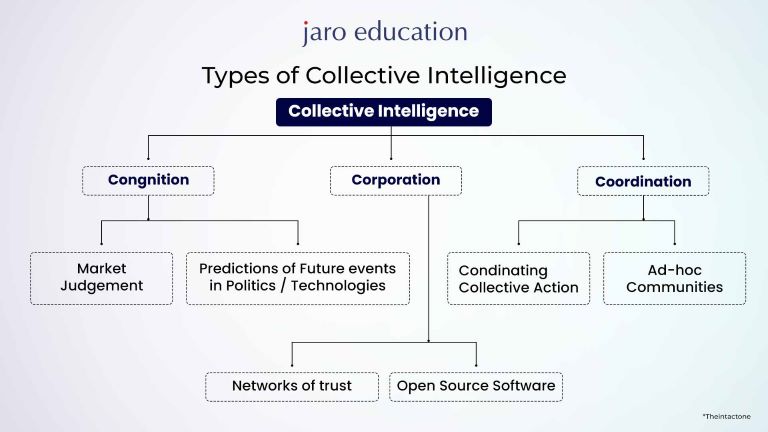
When employees work collectively on a common goal, it is called team management. To make team management a success, individuals must have similar knowledge, skillset and data as a whole. This is called collective intelligence which is a crucial factor for the success of every business. . With the rise of remote work, it is crucial to harness collective intelligence in remote teams as well. This can only be done with solid leadership skills and the use of different interactive events.
Team management requires strong leadership qualities, skills and business acumen. If you want to be a team lead, go for Wharton Interactive’s Advanced Strategy & Leader Program. You can enrol into this program and develop leadership skills. The programme provides experimental learning of team building, practice strategies and pitfalls. Wharton experts coach on the team handling with their own leadership experiences so that aspirants can get a 360-degree idea regarding the same. To know more about the course, register with Jaro Education.
What is Collective Intelligence?
When a large group of people come together and share common skills, data and knowledge to develop creative ideas and address common issues, it is called collective intelligence. This concept is based on the idea that when individuals work together as a team, the organisation can achieve more goals than a single individual could ever achieve independently. In the workplace, collective intelligence has made a profound impact.
When establishing collective intelligence in the workplace or remote work, certain factors are to be considered. These factors aid the efficient team leaders to harness collective intelligence in remote teams.
Factors that Enable Companies to Build Remote Teams
Table of Contents
The number of remotely working organisations has increased since Covid-19. To make the teams work collectively, it is important to harness collective intelligence. Here are some factors that allow remote teams to harness collective intelligence.
Sharing Knowledge
Diverse teams are guaranteed to have varying abilities and IQ levels, along with varying acquired knowledge and social networks. Working collaboratively allows team members to share their talents and information, which increases the aggregate understanding and ability of the team to create and develop better solutions. This, in turn, can help to improve team performance. It is thus the managers’ responsibility to create processes and measures that encourage remote teams to share experiences and knowledge actively. By encouraging brainstorming sessions and open debates, everyone will get a chance to talk, thereby establishing collective intelligence. Individual team members must also be enabled and empowered to do research and seek out vital information to share with the group.
Employees With a Positive Mindset
An organisation must ensure that the staff they are hiring are not self-centred, dominating, non-collaborative and negative. A workplace should always have a positive and collaborative environment, even if it’s remote. Companies must hire employees who will get along with the rest of the team and contribute to a positive team dynamic and culture. These individuals should further be receptive to working jointly, optimistic, open, and team players.
Team Diversity
Companies must have diverse teams with different knowledge and experiences. This way, they could tackle every problem with unique and innovative strategies. Diversity boosts collective intellect while attracting many social networks and relationships that may be valuable in business. Gender diversity, particularly the presence of more women in a team, can help to boost collective intelligence.
Focused Group Work
Teams may generate collective intelligence by encouraging and enabling team members to contribute their thoughts, views, and ideas about how to solve problems or execute certain activities or responsibilities. Instead of working individually, teams can achieve better results when they work as a group by discussing and collaborating on concerns and tasks.
Social Perceptiveness
Emotional intelligence and social perceptiveness are connected with how people receive and respond to nonverbal cues from others. Team leaders must identify and eliminate people who want to stand out and continually steal the spotlight. It’s also advisable to avoid having folks who slack off and don’t contribute to a team. Managers must form teams who are dedicated, collaborative and sensitive.
How to measure Collective Intelligence?
Analysing a team’s collective intelligence is essential before improving it. One approach is to employ a series of activities that assess several characteristics of collective intelligence, including memory, coordination, creativity, and reasoning. For instance, team leaders can ask their teammates to remember data, organise a project, solve logic puzzles and procure ideas. The performance of one team will then be compared to other benchmarks or teams. A survey or questionnaire may also be used to assess your team’s attitudes and behaviours connected to collective intelligence, like learning, communication, diversity, and trust.
Tools to Enhance Collective Intelligence in Teams
Many tools are available to help improve team performance and collective intelligence in the remote workplace.
Virtual Team BuildingTools
There are several benefits of team-building exercises in remote work environments. Managers may utilise various virtual team-building tools to establish integrated working environments favourable to cooperation and develop a healthy work culture. These range from professionally guided team development activities to virtual coffee breaks throughout the day.
Project Management Tools
Various software and applications enable team members to communicate via various devices, share thoughts and updates as well as assign tasks. These tools further help teammates to track a range of products in one place, ensuring a collaborative environment for everyone. BaseCamp and Trello are some project management tools that several organisations popularly use.
Time Management Tools
Tools like Gmail accounts enable employees to share their calendars digitally and also serve to boost productivity and efficiency. They also assist with creating meeting and event reminders, as well as diary scheduling, which may help you avoid being double-booked for meetings. Other technologies, such as Timely, may be used to measure how much time staff spend on various tasks, which can be valuable in controlling efficiency and productivity.
Information & file sharing tools on the drive
It is beneficial to locate one dedicated file-sharing platform to utilise with your remote personnel in order to maximise productivity and standardise communication and information exchange. As long as you have a Gmail account, you can avail the tools like Google Drive, as they are excellent for information sharing. Virtual drives also assist teams in better project management and the recording of decisions and information.
Engagement & Communication Tools
It is important to connect with employees during remote work setup and hence critical to make time for better communication. There are several technological tools available to help remote teams collaborate more effectively. To create virtual meetings and check-ins, tools like Google Meet and Zoom are beneficial. Furthermore, there are apps like Slack that allow teammates to send team messages or direct messages for collaboration opportunities, quick information sharing, and the capacity to submit inquiries.

Importance of Collective Intelligence in Organisations
Lorem ipsum dolor sit amet, consectetur adipiscing elit. Ut elit tellus, luctus nec ullamcorper mattis, pulvinar dapibus leo.
Generates Goodwill
Collective intelligence in teams ensures the goodwill of a company and promotes the development of each individual’s abilities, the formation of a positive environment, and project-based work. Goodwill brings members together, inspires them, and boosts their creativity. All of these variables contribute to the company’s success.
Teams work in harmony
Collective intelligence allows teammates to share information and includes them in the process of decision-making when all of them are on the same wavelength. This setting increases their sense of worth and helps them to build a sense of belonging. This is only possible when they seek to establish tight relationships with other team members.
Develop People Skills
A team with varied backgrounds is ideal for comprehending its significance. Each member may readily discover his or her position in the group because of collective intelligence. It promotes a shared goal while capitalising on the various abilities.
Project mode at work
Working in project mode, i.e., defining a specific goal, is another advantage of collective intelligence in businesses. Within the group, a true synergy and profit centre is therefore developed, with the ultimate objective of consumer happiness.
Offers Motivation and Gain Responsibility
Collective intelligence brings a sense of understanding to the team to make the business objectives more precise. This way, everyone would have an overview of the project and its goals, thereby giving them motivation.
Employees’ accountability grows as a result of collective intelligence. The more motivated the team is, the greater its autonomy will be. As a result, each employee brings unique abilities to the table and is totally dedicated until the project is done.
Thus, with higher collective intelligence, teams can perform better (be it in a remote space or a workplace environment). This is what every employer wants their employees to achieve. This indicates that managers should consider team dynamics and improved team performance and collaboration in the workplace, rather than individual ability and talents. The good news for virtual employees is that collaborative intelligence can be created irrespective of teams working in an office or in a virtual mode.. All that is required is a focus on procedures and team characteristics that foster greater collective intelligence.
To be an efficient leader, it is important to know how to use collective intelligence within teams. This is one of the deciding factors for a company’s success. If you want to be a successful team manager, you can participate in the Advanced Strategy & Leader Program offered by Wharton Interactive. It is a 6-month certification course that would help you become a skilled leader with a cutting-edge curriculum taught by Wharton experts. To know more about it, connect with our admission experts at Jaro Education.








